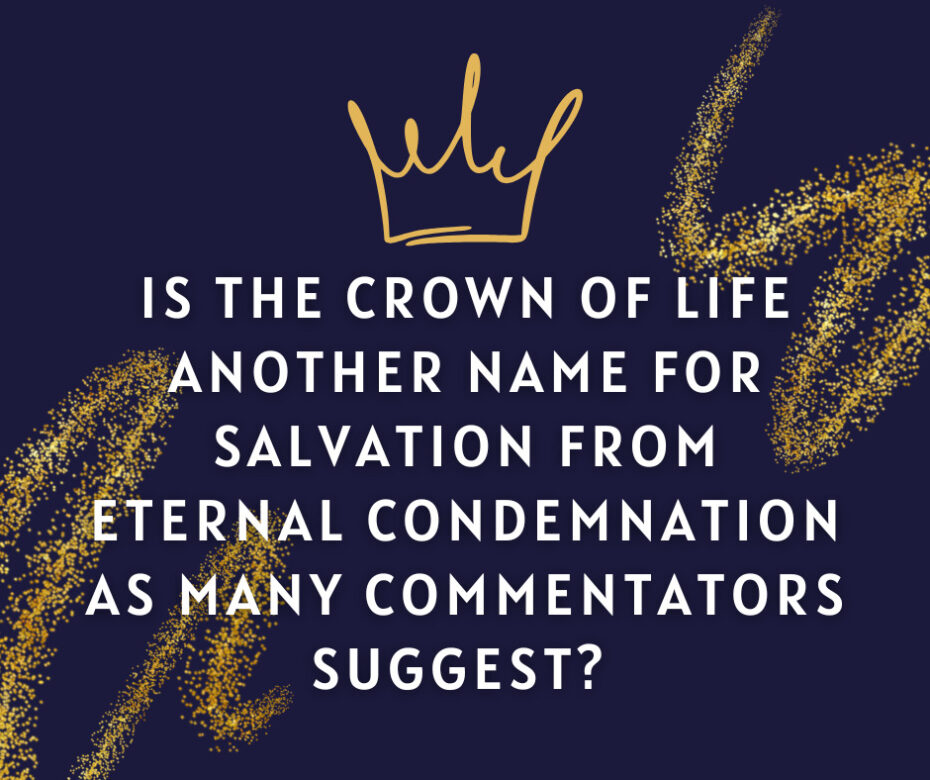Blessed is the man who endures temptation; for when he has been approved, he will receive the crown of life which the Lord has promised to those who love Him.
God rewards us when we endure trials with love toward Him. That is the vital point James bring out in Jas 1:12.
We are to handle trials in a way that honors God and that results in being approved by Him. Compare Rom 5:3-4 where perseverance produces proven character, the same word used here for approved (dokimos).
The crown of life here might refer to ruling with Christ in the life to come. Many passages that speak of possible future crowns concern eternal rewards (e.g., 1 Cor 9:25; 2 Tim 4:8; 1 Pet 5:4; Rev 2:10; 3:11). The exact expression the crown of life only occurs one other time in the NT, Rev 2:10. While the expression does refer to eternal rewards in Rev 2:10, the context is different in Jas 1:12.
Hodges suggests that the crown of life most likely refers to blessings in this life because of the connection of 1:12 with James 5:11 (see here), where the perseverance of Job in trials is linked to blessings in this life.
Hodges comments:
Life will be richer, deeper, fuller for his Christian readers if they are among those who, like Job, reach the end of their trials victoriously. Indeed, every time we successfully endure a period of trouble, the crown of life will be awarded to us anew. In this respect, as in others, the path of the just is like the shining sun, that shines ever brighter unto the perfect day (Prov 4: 18) (James, p. 26, emphases added).
Ron Blue in The Bible Knowledge Commentary, agrees, as he favorably quotes Curtis Vaughan, “The life which is promised is probably life here and now, life in its fullness, life in its completeness” (cf. James 1:4) (Curtis Vaughan, James: Bible Study Commentary, p. 28) (“James,” p. 821).
Some commentators, however, think that eternal salvation itself is the reward. Adamson says, “The crown is the reward of the Christian’s effort, which against the powers of evil is no less agonistic than the athlete’s against his fellow competitors: the crown as his reward is eternal life” (James, p. 68). Likewise, Peter Davids writes, “The actual reward is salvation itself, for (eternal) life is certainly the content of the crown” (James, p. 80). Richardson agrees, seeing a distinction between the present life and the life to come: “These lifelong tests are relieved at the end of life with the reward of divine life” (James, p. 77).
Of course, if the crown of life referred to everlasting life, then it would not be a free gift; it would not be by faith alone; it would not be received prior to death; and it would require perseverance in good works until death. Many commentators openly say that what they call eschatological salvation is not received prior to death and that it requires perseverance in faith and good works until death.
We should not come to James to determine our view of the saving message and then impose that understanding on the Gospel of John and Paul’s epistles. We should do the opposite. We should establish our view of the saving message from the clear passages of Scripture, especially in the Gospel of John, the only evangelistic book in the Bible (John 20:31). Then they can rightly understand James.
I should mention that some commentators see this as referring not to everlasting life or to fullness of life now, but instead to eternal rewards that are in addition to everlasting life. Moo, for example, writes:
Clearly James’s overall purpose in this verse is to encourage believers to endure trials faithfully so that we might receive the reward that God has promised. Some Christians have a difficulty with rewards, objecting that our obedience to Christ should be pure and disinterested, unmotivated by any such crass consideration as future reward. This objection is understandable, and it is certainly the case that far too many Christians bring a selfish and calculating “bottom line” mentality into their service of the Lord, asking “What’s in it for me?” at every step. But the contemplation of heaven’s rewards is found throughout the NT as a spur to our faithfulness in difficult circumstances here on earth. Keeping our eyes on the prize can help motivate us to maintain spiritual integrity when faced with the temptations and sufferings of earthly life. Moreover, as Mitton aptly observes, ‘the rewards are of a kind that only a true Christian would be able to appreciate’ (Moo, James, pp. 70-71).
Whether the crown of life refers to fullness of life now or in the life to come (or both), it is clear that receiving that crown is conditioned upon our love for God. I like this comment by Zane Hodges regarding our need to love God during trials:
In fact, it may be stated that each of our various trials in some way or other is a test of our love for God. With each test there comes the temptation to resist God’s will in sending the trial at all or, at least, the temptation to resent it and thus refuse to allow God to do the character-building work He desires to perform in us. Only when we submit lovingly to God’s mighty hand do we find the crown of life awaiting us at the end of the trial [James, p. 26].
Trials can actually be great blessings in our lives if we remember that God uses them to produce perseverance and character in us. As we keep our love for the Lord Jesus through trials, our lives are crowned here and now (and will be crowned at the Bema if we persevere in that love for Him).


